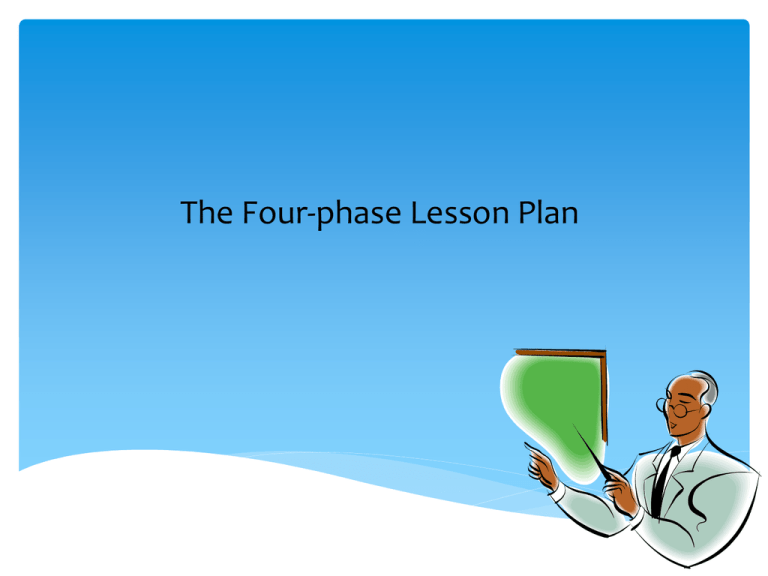Four Phase Lesson Plan Slides
advertisement

The Four-phase Lesson Plan Why? Requirement to be promoted Builds confidence in communication skills Promotes leadership ability A requirement to compete in the Superior Instructor Board Four Phases Inquire Gather Process Apply Inquire Is to determine the lesson’s starting point What do students know? What don’t they know? What do students misunderstand? What are their past experiences? What do students want to know? What is the purpose of the lesson? How motivated are the students to learn the content? What are some practical reasons for students to participate in the lesson? Inquire During this phase, you may want to use an icebreaker or energizer in your lesson. These are physically active games or other activities that increase group interaction, promote a sense of team, generate laughter and a sense of fun, and introduce the concept or lesson objectives. Appropriate Inquire phase learning activities include: Agree/disagree worksheets K-W-L charts Analogies or metaphors Pre-quizzes or pre-tests ‘Group’ graph or ‘4-corners’ Panel discussions Debates Homework reviews Other Gather The purpose of Gather phase is to research and collect information from a variety of sources, to synthesize information, to evaluate existing information, to collect data, to evaluate ideas, or to observe new skills. Gather Some important questions you can ask during this phase are: What new and essential information or new concepts did the students find? What are some new, critical skills? What connections or associations can be made? What can students do to make sense of the new information? What is the best way to gather the information? What new understandings can students construct? Appropriate Gather phase activities include: Graphic organizers Computer searches Jigsaw Interviewing experts Demonstrations Generating examples Socratic questioning Constructivist questions Other Transference of Process Phase The purpose of this phase is to use the new information, practice new skills, and engage in different activities. The following questions can help you and your students. Process Phase What can students do with the information? How can students demonstrate their understanding? What ways can students show relationships among the data or concepts? How can students practice and improve their skill(s)? What can students do to reinforce their understanding of the new concept? How can students ensure the new information is stored in long-term memory? Appropriate Process Phase activities include: Games Laboratory experiments Role play Peer teaching Rehearsal Simulations Reciprocal teaching Graphic organizer Other Apply The purpose of the Apply phase is to help students make real-life applications of the new information or ideas. Students can also consider ways to integrate the lesson concepts or skills with other curriculum areas They also plan ways to transfer their learning into personal use outside the classroom Apply Questions that can help both the instructor and students during this phase are: What else can be done with the information? What else is needed to make the information usable? Appropriate Apply phase activities include: Action research Field trips Interviews Portfolios Student-designed homework activities Personal goals and objectives Creative connections Problem-based projects Other The Three Components of Each Phase Direct Student Focus Learning Activity Reflection Direct Student Focus As a teacher, you have a responsibility to help your students focus on specific elements of the learning activity. You will guide their thought processes and help them focus on key processes or content during the learning activity. You will eliminate or filter extraneous information so students can direct their attention to what is critical for their learning. Learning Activity A Learning Activity may appear in many guises. As a teacher, you should plan activities that best present the information and allow students the opportunity to participate in the learning process. If you are in the role of teacher, have students engage in active learning experiences that assess their current level of understanding of the lesson content, their level of interest in the lesson, and their goals for their own learning. Reflection As the teacher, ask questions that help students think about, reflect on, or make sense of their learning experiences. Having students discuss or write down what they understand helps them clarify their thinking and improve their understanding, as well as strengthen their memory connections. It is during this reflection process that students begin to understand the importance and purpose of the learning activity. Key Notes Inquire – to ask about or search into; to put a question, seek for information by questioning. Energizer – someone or something that increased the capability of acting or being active Gather – to bring together; to pick up or accumulate; to assemble. Process – a natural phenomenon marked by gradual changes that lead to a particular result; a series of actions or operations conducted to an end. Key Notes Focus – a center of activity, attraction or attention; a point of concentration; directed attention Facilitator – one who leads a discussion Reflection – a thought, idea, or opinion formed or a remark made as a result of meditation; consideration for some subject matter, idea, or purpose. Lesson Review 1. List the four lesson plan phases. Choose one and explain it. 2. What are the three components to each lesson plan phase? 3. Define the term “facilitator” and explain what a facilitator does. Conclusion For teachers, lesson plans are the building blocks used to help organize thoughts and information. The Four-Phase Lesson Plan was devised to facilitate the planning process. As you develop each phase of your lesson plan, remember to include the following components: Direct Student Focus, Learning Activity, and Reflection. If you are called upon to instruct others, your audience will benefit from this wellorganized approach.
